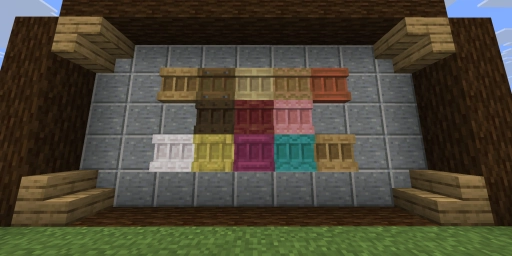At first glance, Minecraft’s new shelves might not look all that spectacular, but alongside the Copper Golem they’re arguably the best feature of 1.21.9! They can do far more than meets the eye. Fundamentally, they act like improved item frames—but that’s just the tip of the iceberg. With shelves you can revolutionize how you sort your inventory and unlock new building ideas. Shelves are extremely versatile blocks that every player should start using. Whether for storage or decoration, let’s take a closer look at what shelves can do!
Minecraft shelves explained: functions, slots, and crafting

Think of shelves as item frames with more functionality. While frames hold only one item, a shelf lets you place three items side by side. They also look cleaner, with three centered slots and thicker bars at the top and bottom.
To craft shelves, you’ll need stripped logs. This feature is often overlooked and is a great way to work bare logs into crafting recipes. You’ll have to manually strip logs with an axe to get the block—but it’s well worth it! Shelves come in all wood types, from regular oak and bamboo to warped and crimson logs from the Nether. Place three stripped logs across the top row and three across the bottom row of the crafting table to get six shelves.
Store items and stacks in Minecraft shelves

As the name suggests, shelves are storage for your items. They’re better than item frames because they can display up to three items at once. And they don’t just hold single items—they can store up to one full stack per slot. Each shelf slot takes exactly one inventory slot’s worth. That means you can store 64 cobblestone or 16 eggs, for example. Tools, however, can only be stored singly.
Click a shelf’s empty slot with an item to transfer that stack into the shelf. You can remove it with an empty hand, or swap it with the item in your hand.
Shelves are perfect as temporary storage, as labels for chests, or simply as decorative accents in any build. Since items are shown directly, you can decide exactly what to display. In kitchens, for example, you might show food; by an enchanting table, Lapis Lazuli and books. It’s much nicer than constantly opening chests.
Redstone with Minecraft shelves: hoppers, comparators, and signals

Shelves also have functionality that ties into Redstone. For example, they can be filled and emptied with hoppers, which is incredibly handy! This means less chest opening and inventory shuffling—shelves can do that for you. Items fill until the slot is full, and shelves fill from left to right.
Thanks to their three slots, shelves can emit Redstone signals that a comparator can read. You can use this for puzzles or secret passages, among other things. When all slots are filled, they can output and be read up to a signal strength of 7.
Signals are emitted as follows:
- Signal strength 1 for the left slot
- Signal strength 2 for the middle slot
- Signal strength 4 for the right slot
Swap your Minecraft hotbar with shelves and Redstone

The most important interaction between Redstone and shelves happens when you power the shelves themselves. Their look changes slightly—the vertical dividers between the three slots disappear. Now, when you click the shelf, the last three items in your hotbar (counting from the right) are taken and stored in the shelf. If the shelf already contained items, they’ll be swapped.
A Redstone signal makes the shelf behave as a unit, and it’s no coincidence that it has exactly three slots. Your on-screen hotbar has nine slots, so if you place three shelves side by side and power them all, you can store your entire hotbar at once! With two shelves, the six rightmost slots get swapped.
This is incredibly useful when you want to quickly swap your gear. You can set up multiple hotbars—for caving, woodcutting, or building projects. And thanks to hopper support, you can even have slots auto-refilled while you’re not using them.
Minecraft shelves as decoration: build ideas and “vertical slabs”

Beyond all the functional uses, shelves are fantastic for decoration—and not just for showing off items. Many players now call shelves “vertical slabs,” a block type Minecraft fans have been wishing for for years.
Shelves work great as a vertical half-step between full blocks. They also pair nicely with trapdoors, which also come in every wood type. They’re a terrific accent for adding depth and making your builds feel more three-dimensional.
Another neat trick is showing items in combination with banners. You can, for example, craft letter banners and use them as signage.
More ideas for shelves as decorative elements:
- Base or ornament for columns
- Bed headboard
- Rim around dirt as a planter
- Drawers for dressers
- Backrests for chairs
- Transitions for arches
- Fence or property border
- Mantelpiece
- Shutters
- Street sign
- Shelving for a supermarket or store
Your creativity is the only limit. Shelves aren’t just functional—they change how you approach buildings and the accents you can add.
Conclusion: Minecraft shelves for storage, Redstone, and decor
With version 1.21.9, Minecraft adds not only a range of copper items, but also the shelf. It may look unassuming at first, but it’s helpful in all sorts of situations. You can display and temporarily store up to three items, and with Redstone you can even swap your entire hotbar. At the same time, shelves are wonderful decorative blocks, acting a bit like vertical half-slabs.
Rent one of our Minecraft servers and discover the new shelves with your friends. You’ll surely come up with even more ways to put them to use together.
More interesting articles
Minecraft 1.21.9: Copper Update with Copper Golem & Shelves
Minecraft Copper Golem: Automatic Item Sorting Without Redstone (1.21.9)
Efficient Inventory Management in Minecraft: Tips and Strategies
Minecraft Automatic Storage System: A Guide for Efficient Item Sorting
Minecraft Redstone Components Explained: Signal Sources, Connections & Receivers




